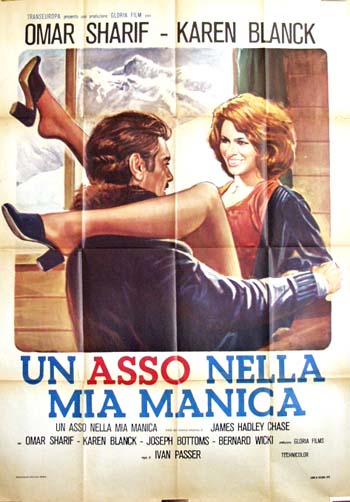
ACE UP MY SLEEVE
US, 1976, 92 minutes, Colour.
Omar Sharif, Karen Black, Joseph Bottoms, Bernhard Wicki.
Directed by Ivan Passer.
Ace up my Sleeve is an odd film - thriller conventions with a dash of ironic comedy. It was directed by Czech Ivan Passer who has had a mixed career in the United States since leaving Czechoslovakia and a successful career in his native country. Director of such films as Born to Win with George Segal as a drug addict and Law and Disorder with Ernest Borgnine and Carol O'Connor as well as the rather pleasant comedy thriller Silver Bears with Michael Caine, this film is interesting but off-beat and probably a puzzle to the average audience. Its European setting is rather exotic and Karen Black and Omar Sharif are an odd leading couple. Joseph Bottoms who was emerging in his career at this stage is an interesting foil to the two central characters.
1. What kind of film was this? Which genre did it belong to? The quality of its success? The nature of its appeal to audiences?
2. The meaning and significance of the title? The symbolism of the credits, the head, the animation? The significance of the ending with Roth and his outline in the snow? Did this add to the understanding of the film?
3. How seriously was it all to be taken? How comically? Its qualities as a thriller? The nature of the popular ingredients? How well did they jell?
4. The initial focus on Ferren and his car? Omar Sharif's style and personality? The significance of the car deal? His work, the office where he worked, his dealings in finance? His attitude towards sex? His relationship with Susan, the humiliation and sadism? His skill in deals, his plans, especially for Susan's wedding? His thinking that he was master of the situation?
5. How seriously was he to be taken as a character? His own serious view of himself, his inferiority and selfishness? The film's comic presentation of him? His participation in Susan's wedding? The threat of exposure about his money deal? The threats to his life? His puzzle? His return to Susan and trying to get round her? His use of Larry? His attempts to save himself?
6. How ironic was it that he was a victim of Roth all the time? Roth and his closed-circuit television? Roth masterminding what happened, and why it happened?
7. How attractive was Susan as a character? Her skill in business, love for Ferren, going along with his plan to marry Roth, the effect of the ceremony, the reception, her change of attitude, growing fond of Roth? Her fondness for Larry, their sporting relationship at the skiing, the driving and the swimming pool? Taking him to the castle? Sexuality? The bizarre aspects of her attitudes? Sex and violence and killing? Her relenting? Her surviving with Ferren? An interesting characterization?
8. The importance of Larry in the film? A young innocent American out of his depth? His skiing ability, swimming and driving? His shyness and boasting? The symbolism of his discussion about ghosts and death in the castle? His fear of sexuality yet his desire? His wanting to assist Susanne and the irony of his death?
9. The sinister character of Roth and the way he was visualized? An watching the television? Playing God? Dependent on his henchmen? Murdering his wives? Loving Susan? His plans for her, the effect of the marriage, his attempts to murder Ferren? His watching? His being hurt by Susan's attack on him via the television set? The reason that he froze to death? What insight into the evil of the big business man?
10. The importance of the business characters? Their meetings and discussion of finance? The people at the inn, the inn-keeper an murderer, the masseuse and the murder?
11. The final confrontation with Susan and Roth via the television set? The truth told? The attitude of Susan and the revelation? Ferren's understanding? Roth being hurt, the melodramatics of the television set?
12. How serious was the film in its theme? The contribution of each character?
13. The film as a fable about modern European society and its good and evil, seriousness, stupidity?
14. How well did the film show themes of society and relationships, money, sexuality, humiliation, pride and power? An ironic exploration of values?